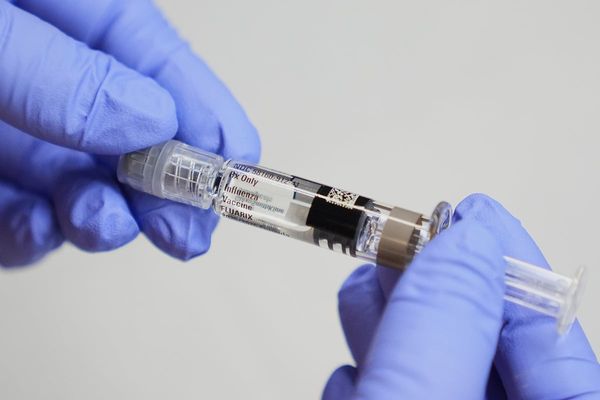Amgen stock rebounded Wednesday, shaking off "overdone" fears that its monthly weight-loss shot, MariTide, causes excessive bone mineral density loss.
Late Tuesday, shares took a beating after a Cantor Fitzgerald analyst unearthed data showing a 420-milligram dose of Amgen's MariTide over 12 weeks causes patients to lose about 4% of their bone mineral density. Lowering bone mineral density increases the risk for fractures.
But Matt Phipps, a William Blair analyst, noted that significant weight loss is often tied to declining bone mineral density. He called concern about a 7% drop for Amgen stock on Tuesday "overdone."
In one study, bariatric surgery patients lost 5% to 7% of their bone mineral density over six months. Novo Nordisk also looked at fracture risk in the cardiovascular outcomes study of weight-loss shot Wegovy. Patients treated with Wegovy had a higher risk of hip and pelvic fractures than placebo recipients.
"We believe the Phase 2 results (which will have more than four to six patients per arm, as almost 600 participants have been enrolled in the Phase 2 trial) will provide a more meaningful look at the impact as long as it is taken in the context of general expectations of reduced BMD following significant weight loss by any means," Phipps said in a report.
For its part, Amgen stood by MariTide. The company expects to have Phase 2 data later this year.
"As previously stated, Amgen does not see an association between the administration of MariTide and bone mineral density changes," the company said in a written statement. "The Phase 1 study results do not suggest any bone safety concern or change our conviction in the promise of MariTide."
Amgen stock closed with a 0.9% gain, at 301.44, pulling back from a steeper jump in earlier action.
Hard To Draw Conclusions
The scientific evidence is split on whether Amgen's approach with MariTide could cause bone mineral density loss, RBC Capital Markets analyst Gregory Renza said in a client note.
MariTide works by mimicking GLP-1, a hormone tied to satiety and blood sugar levels. On the flip side, it blocks another hormone called GIPR. GIPR is involved in insulin release and glycemic control. Rival drugs from Eli Lilly and Viking Therapeutics also target GIPR, but they mimic it.
Renza noted the placebo group had a higher bone mineral density loss in scans of their femurs than most of the MariTide-treated patients. Further, the results stem from a small study.
This makes "drawing the ultimate conclusions about MariTide's profile in the upcoming Phase 2 data difficult without additional context," he said.
He rates Amgen stock an outperform.
Bone Health Decrement?
Piper Sandler analyst Christopher Raymon said this isn't new data — for Amgen.
"The most obvious point to us here, but one worth remembering, is that Amgen has much more experience with this drug than what was published in the February paper," he said in a report. "While it's been rather frustrating that management has not provided any color from the ongoing Phase 2, one has to think BMD impact was considered when deciding dose levels for the Phase 2 trial."
Studies have shown amplifying the impact of GIPR — like Lilly's and Viking's drugs — provides a bone health benefit.
"The inverse of that, of course, is that GIPR antagonism could confer a bone health decrement," he said. "But we still don't know the dose or dose interval that management is contemplating for its broad Phase 3 program."
He kept his overweight rating and 344 price target on Amgen stock.
Follow Allison Gatlin on X, the platform formerly known as Twitter, at @IBD_AGatlin.







